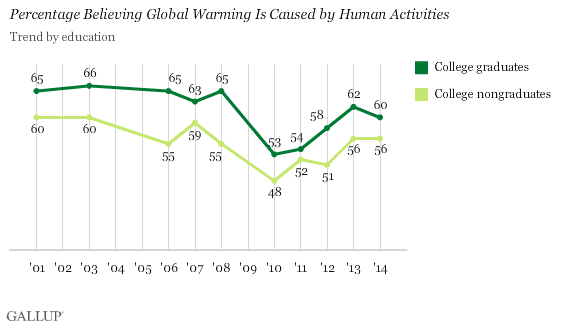The past decade has seen some truly clever media tricks being used against climate science. The most successful one was the so-called “Climategate” scandal of 2009. You can see its effects on the Gallup poll, above.
Climategate was a very successful “meme“, a term created by Richard Dawkins in analogy with “gene” – a meme is a reproductive unit in the mediaspace. It works like a virus, and, as a virus, it tends to lose its potency when the system develops ways to fight it. So, the climategate meme lost potency in a few years after its introduction and the Gallup curve started going up again.
2012 saw the birth of a new and powerful anti-science meme: the “climate change has stopped” one, created by David Rose with an article in the Daily mail. The effect was less pronounced than that of the Climategate meme, nevertheless the idea of the “pause” went viral and it is probably the origin of the drop/stasis in the Gallup curve from 2013 to 2014.
But also the “pause” meme has lost potency; with 2015 on track to become the hottest year ever recorded, it becomes more and more difficult to maintain that climate change has stopped. So, with the Paris conference on climate approaching, it is probably the right time for a new anti-science meme appearing in the media.
Not surprisingly, the media is all abuzz with the idea of a”mini ice age” that should occur at some moment in the 2030s. Look at the results of a “Google Trends” search. Remarkable, indeed!
…click on the above link to read the rest of the article…






